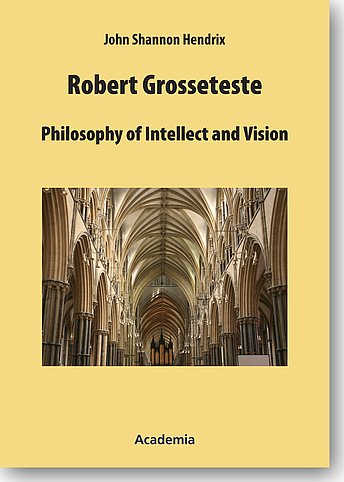Hendrix
Robert Grosseteste
ISBN 978-3-89665-524-0
englischRobert Grosseteste was the first chancellor of Oxford University, and Bishop of Lincoln 1235-53. This book focuses on two important areas in his philosophy at the beginning of the thirteenth century: Philosophy of Intellect and Philosophy of Vision.
This project aims to contribute to the importance of Robert Grosseteste in the history of philosophy.
The book is based on readings of important manuscripts by Grosseteste: On Light; On Lines, Angles and Figures; Commentary on the Posterior Analytics; and Hexaemeron.
An important part of this project is an examination of the principal sources for Grosseteste's philosophy: the classical philosophers (Plato, Aristotle, Euclid); the Greek commentators on Aristotle (Alexander of Aphrodisias and Themistius); the Arabic commentators on Aristotle (Alfarabi, Avicenna, Averroes); and the Neoplatonic tradition, which includes the Theology of Aristotle (based on the Enneads of Plotinus), the Liber de Causis (based on the Elements of Theology of Proclus), and the writings of Pseudo-Dionysius. The examination builds upon the work of Grosseteste scholars such as James McEvoy, Richard William Southern, Alistair Cameron Crombie, and Bruce Stansfield Eastwood. It also builds upon the more general work of scholars such as Franz Brentano and Herbert A. Davidson. Certain philosophical concepts are developed from the author's previous books, namely Aesthetics and the Philosophy of Spirit and Platonic Architectonics.
Emphasis is placed on the relation between Grosseteste's philosophies and the previous philosophical influences, as well as subsequent philosophies in the middle ages (particularly the Franciscan School or Oxford School), and the Renaissance to the twentieth century. The philosophies are also considered in relation to the architecture of Lincoln Cathedral.
Robert Grosseteste was the first chancellor of Oxford University, and Bishop of Lincoln 1235-53. This book focuses on two important areas in his philosophy at the beginning of the thirteenth century: Philosophy of Intellect and Philosophy of Vision.
This project aims to contribute to the importance of Robert Grosseteste in the history of philosophy.
The book is based on readings of important manuscripts by Grosseteste: On Light; On Lines, Angles and Figures; Commentary on the Posterior Analytics; and Hexaemeron.
An important part of this project is an examination of the principal sources for Grosseteste's philosophy: the classical philosophers (Plato, Aristotle, Euclid); the Greek commentators on Aristotle (Alexander of Aphrodisias and Themistius); the Arabic commentators on Aristotle (Alfarabi, Avicenna, Averroes); and the Neoplatonic tradition, which includes the Theology of Aristotle (based on the Enneads of Plotinus), the Liber de Causis (based on the Elements of Theology of Proclus), and the writings of Pseudo-Dionysius. The examination builds upon the work of Grosseteste scholars such as James McEvoy, Richard William Southern, Alistair Cameron Crombie, and Bruce Stansfield Eastwood. It also builds upon the more general work of scholars such as Franz Brentano and Herbert A. Davidson. Certain philosophical concepts are developed from the author's previous books, namely Aesthetics and the Philosophy of Spirit and Platonic Architectonics.
Emphasis is placed on the relation between Grosseteste's philosophies and the previous philosophical influences, as well as subsequent philosophies in the middle ages (particularly the Franciscan School or Oxford School), and the Renaissance to the twentieth century. The philosophies are also considered in relation to the architecture of Lincoln Cathedral.


